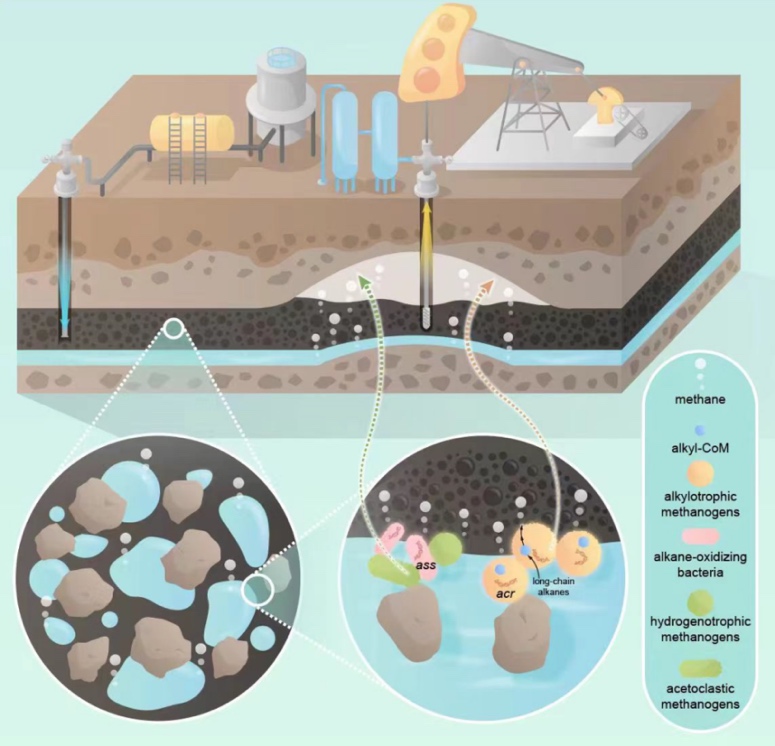On 2024 July 31, Professor Meng Li’s group from the Institute for Advanced Study of Shenzhen Universitycooperated with Professor Lei Cheng’s group from Biogas Institute of Ministry of Agriculture and Rural Affairspublished a paper titled ‘Anaerobic hydrocarbon biodegradation by alkylotrophic methanogens in deep oil reservoirs’ in a Nature Index JournalThe ISME Journal(2024IF=10.8).Inthispaper,they found that alkylotrophic methanogens are widely distributed in Chinese oil reservoirs and play a key role in the degradation of crude oil (Figure 1).Professor Meng Liand Professor Lei Cheng are co-corresponding authors. Assistant professor Cui-Jing ZhangfromIAS and PhD candidate Zhuo Zhou and Associate researcher Guihong Cha from Biogas Institute of Ministry of Agriculture and Rural Affairs are co-first authors.

Figure 1. A schematic diagram showing biodegradation mechanisms in subsurface oil reservoirs
It is generally believed that the biodegradation of crude oil to produce methane is the cooperation between anaerobic hydrocarbon degrading bacteria and methanogenic archaea. Until 2022, Lei Cheng's team, Meng Li's team and collaborators discovered the existence of alkylotrophic methanogens Ca. Methanoliparum that can directly degrade long-chain alkyl hydrocarbons to produce methane, but its ecological function has yet to be evaluated. This study collected 209 samples from 15 underground reservoirs in China. By analyzing the crude oil composition, microbial composition and metabolites of these samples, it was found that such alkylotrophic methanogens were present in 85% of the reservoir samples, and alkyl-coenzyme M, a specific intermediate metabolite of alkylotrophic methanogenesis, was detected in 52% of the samples. These results suggest that alkylotrophic methanogens may play an important role in the biodegradation of crude oil. Further metagenomic and metatranscriptomic analysis showed that Ca. Methanoliparum dominated the degradation of hydrocarbons in biodegraded oil samples from Changqing, Jiangsu and Shengli oilfields, and Ca. Methanoliparum was detected in samples collected in Shengli oilfields over a span of 15 years. This study shows that alkylotrophic methanogens play a wide and important role in the process of reservoir biodegradation and methanogenesis, further expanding our understanding of carbon metabolism in the deep biosphere, and laying a scientific foundation for the bio-gasification of residual crude oil in depleted reservoirs (" underground biogas engineering ").
This work was supported by the grants from the National Natural Science Foundation of China, the Guangdong Major Project of Basic and Applied Basic Research, the Shenzhen Science and Technology Program and Shenzhen University 2035 Program for Excellent Research.
Paperlink::https://academic.oup.com/ismej/advance-article/doi/10.1093/ismejo/wrae152/7724878


